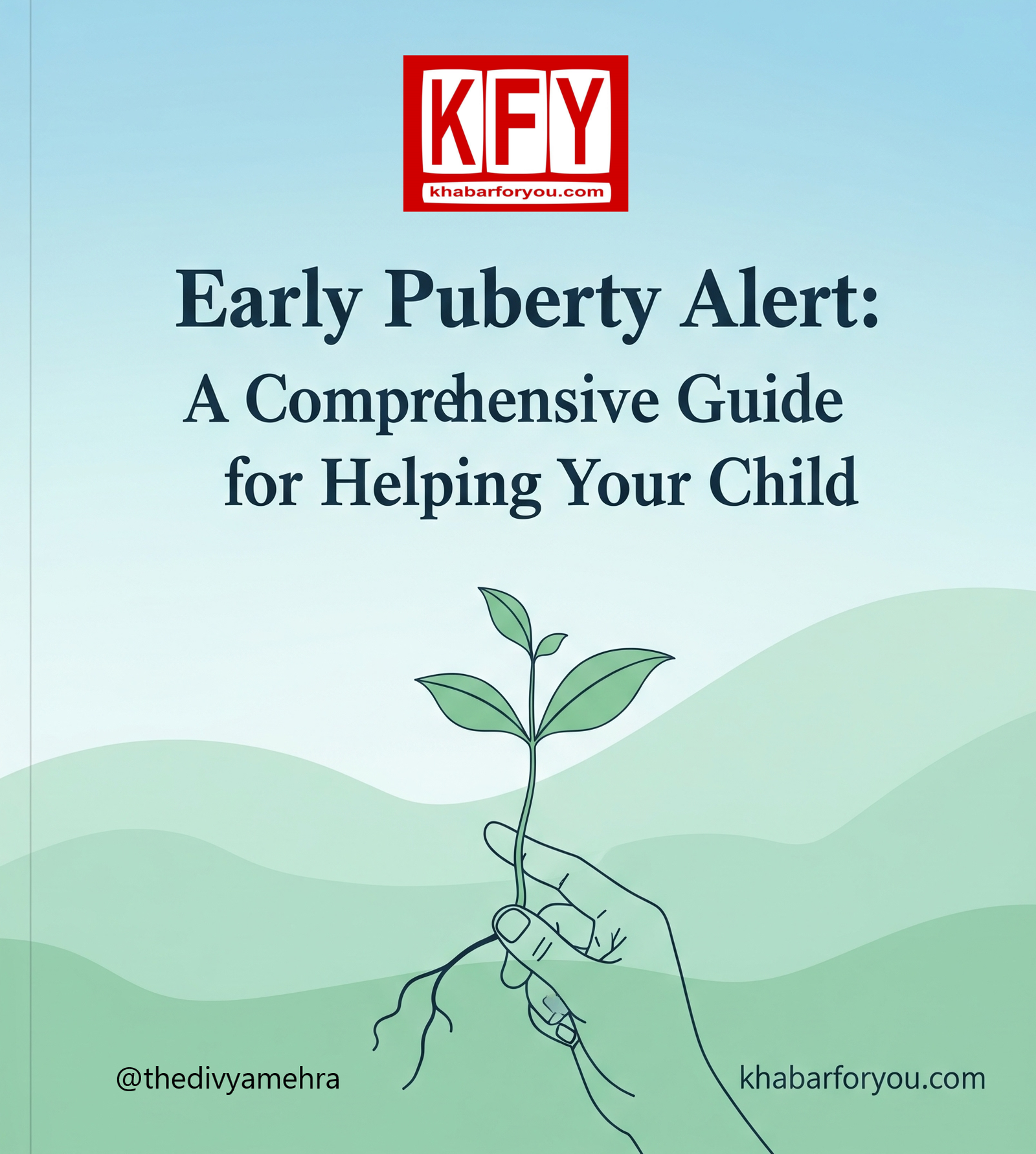Early Puberty Alert: A Comprehensive Guide for Helping Your Child

- DIVYA MOHAN MEHRA
- 17 Jul, 2025
- 275690

Email:-DMM@khabarforyou.com
Instagram:-@thedivyamehra


In recent decades, there has been a noticeable trend of children experiencing the onset of puberty at younger ages. This phenomenon, often referred to as early or precocious puberty, can bring a unique set of challenges for both children and their parents. Understanding the signs, potential causes, and how to provide effective support is crucial for navigating this often-confusing period.
Read More - World Emoji Day: भावनाओं की एक वैश्विक भाषा का उत्सव
What is Early Puberty?
Generally, puberty is considered early if it begins before age 8 in girls and before age 9 in boys. In girls, signs include breast development, pubic hair growth, and menstruation. In boys, it involves testicular enlargement, pubic hair, and voice changes. While the physical changes are the most apparent, early puberty also ushers in significant emotional and psychological shifts.
Why is Puberty Starting Earlier?
The exact reasons for the global trend of earlier puberty are not fully understood, but several factors are thought to play a role:
Nutrition and Obesity: Improved nutrition and higher rates of childhood obesity are strongly linked to earlier pubertal onset, particularly in girls. Adipose tissue produces leptin, a hormone that influences pubertal timing.
Environmental Factors (Endocrine Disruptors): Exposure to certain chemicals in the environment, known as endocrine-disrupting chemicals (EDCs) like phthalates and BPA found in plastics, pesticides, and personal care products, are being investigated for their potential to mimic or interfere with hormones, thereby accelerating puberty.
Genetics: While environmental factors are increasingly recognized, genetics still play a significant role in determining the timing of puberty.
Psychosocial Stress: Some research suggests a potential link between chronic stress and early puberty, though more studies are needed in this area.
Challenges Faced by Children with Early Puberty
Children experiencing early puberty often grapple with a range of difficulties:
Psychological and Emotional Impact: They may feel self-conscious or different from their peers, leading to anxiety, depression, and low self-esteem. They might not be emotionally ready for the physical changes they are undergoing.
Social Challenges: Being physically more developed can lead to different social expectations from adults and peers, sometimes placing them in situations they are not mature enough to handle. They may be mistaken for older than they are.
Physical Health Concerns: While generally harmless, early puberty can sometimes be a symptom of an underlying medical condition. It can also lead to shorter adult height due to the premature fusion of growth plates.
Behavioral Issues: The hormonal surges can contribute to mood swings, irritability, and sometimes risk-taking behaviors.
How to Help Your Child Navigating Early Puberty
Parents play a pivotal role in supporting their child through early puberty. Here's a comprehensive guide:
1.Open and Honest Communication: Create a safe space for your child to ask questions and express their feelings. Use age-appropriate language to explain the changes happening to their body. Reassure them that what they are experiencing is normal for some children and not their fault.
2.Seek Medical Advice: If you suspect early puberty, consult your pediatrician. They can confirm the diagnosis, rule out any underlying medical conditions, and discuss potential treatment options (like GnRH analogues to delay puberty if medically necessary).
3.Provide Emotional Support: Validate their feelings of confusion, embarrassment, or anger. Emphasize that physical development doesn't equate to emotional maturity. Help them build self-esteem and body positivity.
4.Educate Them: Provide accurate information about puberty, menstruation (for girls), hygiene, and the emotional aspects of these changes. Knowledge can reduce anxiety and empower them.
5.Address Social Challenges: Help your child develop strategies for handling peer comments or questions. Encourage friendships with children who are supportive and understanding. Discuss appropriate social boundaries.
6.Maintain a Healthy Lifestyle: Encourage a balanced diet rich in fruits, vegetables, and whole grains, and regular physical activity. Limit processed foods and sugary drinks.
7.Minimize Exposure to Endocrine Disruptors: While not always easy, try to reduce exposure to EDCs by choosing fresh foods, using glass or stainless steel containers, avoiding scented products, and being mindful of plastics.
8.Connect with Other Parents: Sharing experiences with parents whose children are also undergoing early puberty can provide valuable insights and a sense of community.
9.Focus on Emotional Maturity: Encourage activities and discussions that foster emotional and social development, helping them catch up emotionally with their physical changes.
10.Consider Professional Support: If your child is struggling significantly with anxiety, depression, or behavioral issues, consider seeking help from a child psychologist or therapist.
Summary Points:
Early Puberty Defined: Puberty starting before age 8 in girls and 9 in boys.
Potential Causes: Linked to nutrition/obesity, environmental factors (endocrine disruptors), genetics, and possibly stress.
Challenges for Children: Psychological (anxiety, low self-esteem), social (feeling different, misunderstood), physical (potential for shorter height, medical concerns), and behavioral (mood swings).
Parental Support is Key:
Open Communication: Talk honestly and age-appropriately.
Medical Consultation: Seek pediatrician's advice to rule out issues and discuss options.
Emotional Support: Validate feelings, build self-esteem.
Education: Provide accurate information.
Social Guidance: Help navigate peer interactions.
Healthy Lifestyle: Promote good diet and exercise.
Minimize EDCs: Reduce exposure to potential endocrine disruptors.
Community: Connect with other parents.
Focus on Emotional Growth: Encourage activities that foster maturity.
Professional Help: Seek therapy if significant struggles arise.
Early puberty can be a challenging journey, but with understanding, open communication, and proactive support, parents can help their children navigate this period with resilience and confidence.
Business, Sports, Lifestyle ,Politics ,Entertainment ,Technology ,National ,World ,Travel ,Editorial and Article में सबसे बड़ी समाचार कहानियों के शीर्ष पर बने रहने के लिए, हमारे subscriber-to-our-newsletter khabarforyou.com पर बॉटम लाइन पर साइन अप करें। |
| यदि आपके या आपके किसी जानने वाले के पास प्रकाशित करने के लिए कोई समाचार है, तो इस हेल्पलाइन पर कॉल करें या व्हाट्सअप करें: 8502024040 |
#KFY #KFYNEWS #KHABARFORYOU #WORLDNEWS
नवीनतम PODCAST सुनें, केवल The FM Yours पर
Click for more trending Khabar


Leave a Reply
Your email address will not be published. Required fields are marked *
Search
Category







